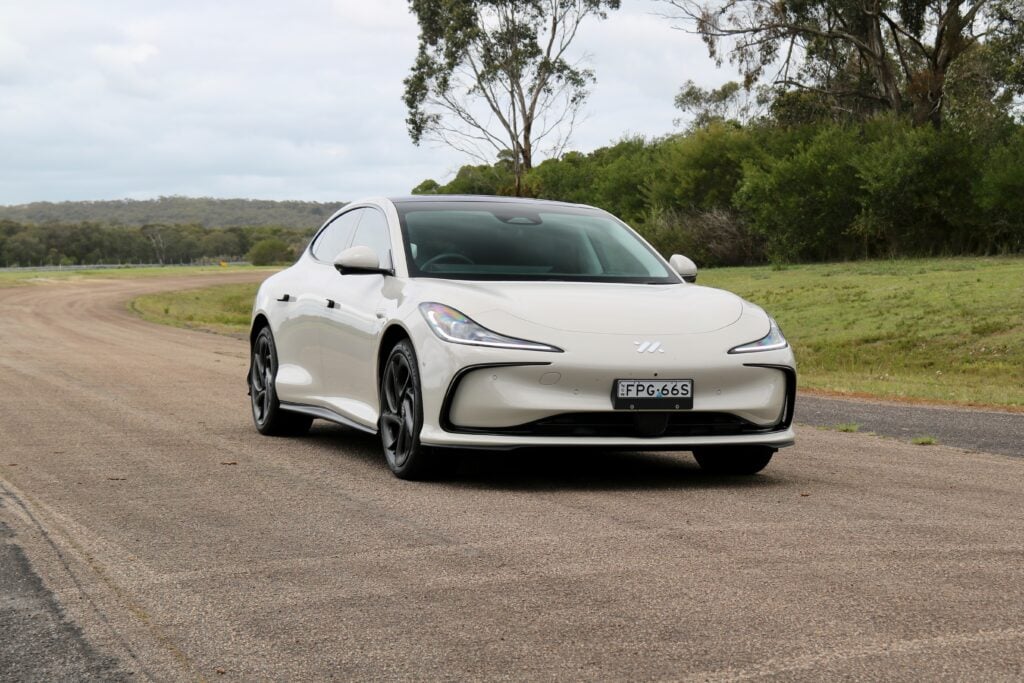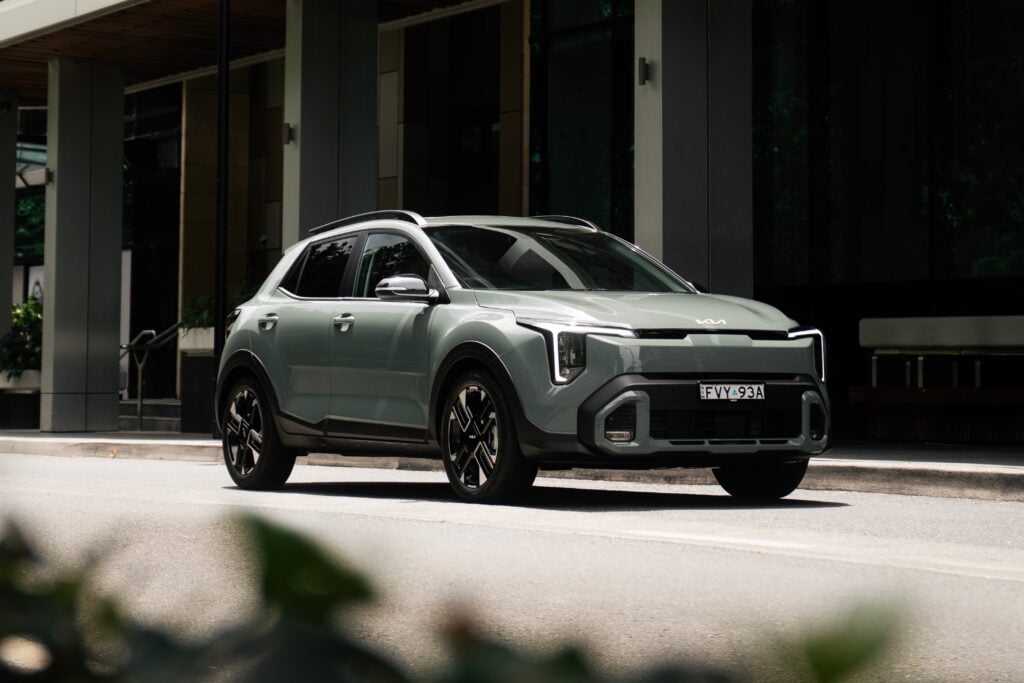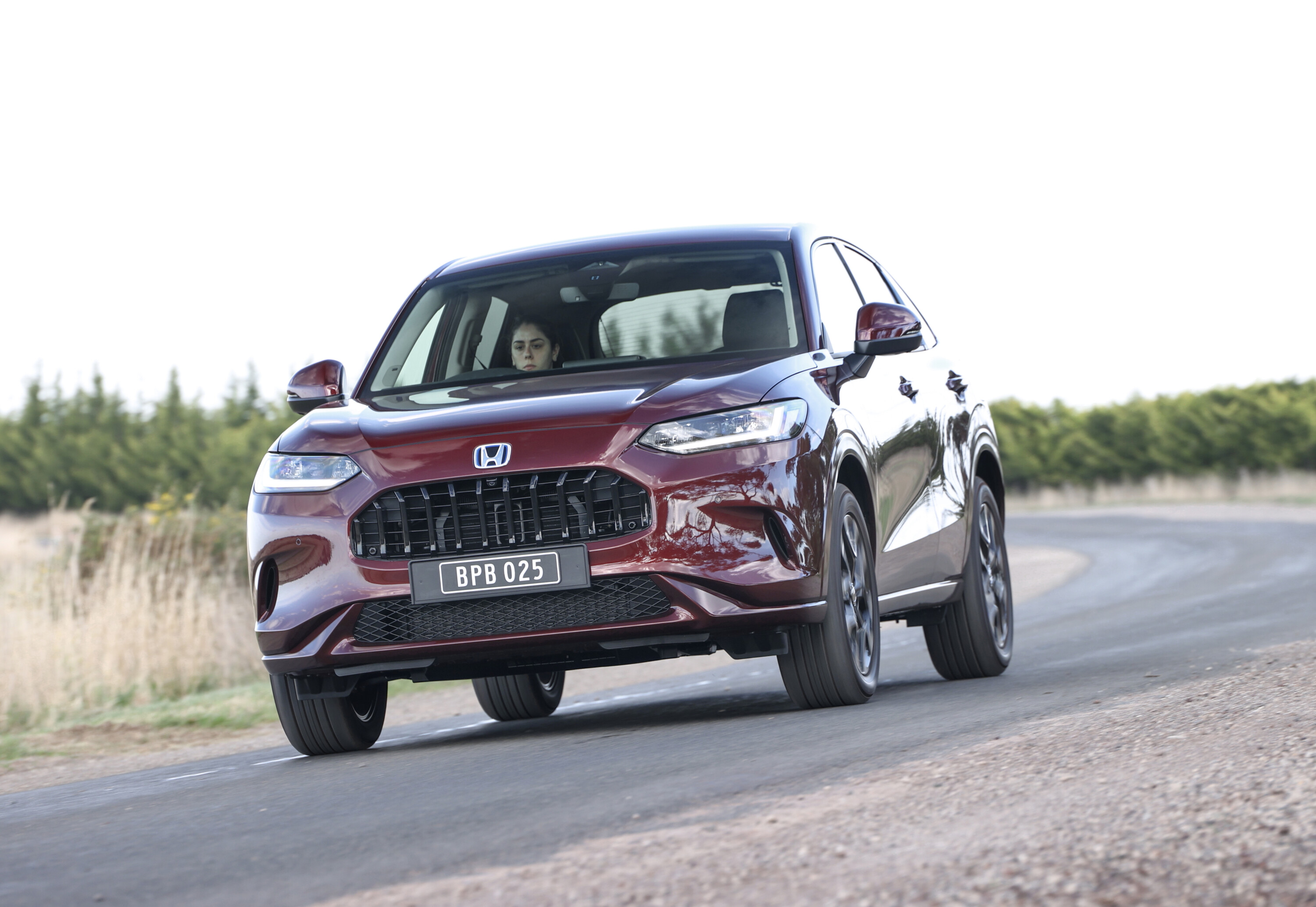
Score breakdown
Things we like
- Well-presented cabin with up-to-date tech across the range
- Planted chassis and comfortable ride
- Seamless hybrid operation
- Agency model easier to swallow when the price is right
Not so much
- Rather small boot
- High-set floor in second row
- Blind-spot monitoring reserved for top grade
- Hybrid’s inconsistent steering feel
Twenty-six years ago, the original Honda CR-V defined the compact crossover in Australia. Now known as The Medium SUV, Honda’s strength in this segment has waned in the last 12-18 months, with Toyota’s RAV4, Mazda’s CX-5 and Nissan’s fantastic new X-Trail having entered the picture.
As the CR-V has swollen in size for its sixth generation, Honda decided to employ the middleweight ZR-V – or HR-V in America – for Australia’s most popular market segment.
Smaller than a RAV4 or CX-5, the ZR-V is still bigger than the Karoq and Corolla Cross. Available with two rows of seating, three trim levels and your choice of turbo-petrol or hybrid powertrains, the fixed-price ZR-V range spans $40,200-$54,900 drive-away. It seems Honda is more on-the-money with its list prices than when the Civic came along.
And it needs to be on the money, as the ZR-V is the primary puzzle piece in Honda’s ambition to drive its annual sales back above 20,000.
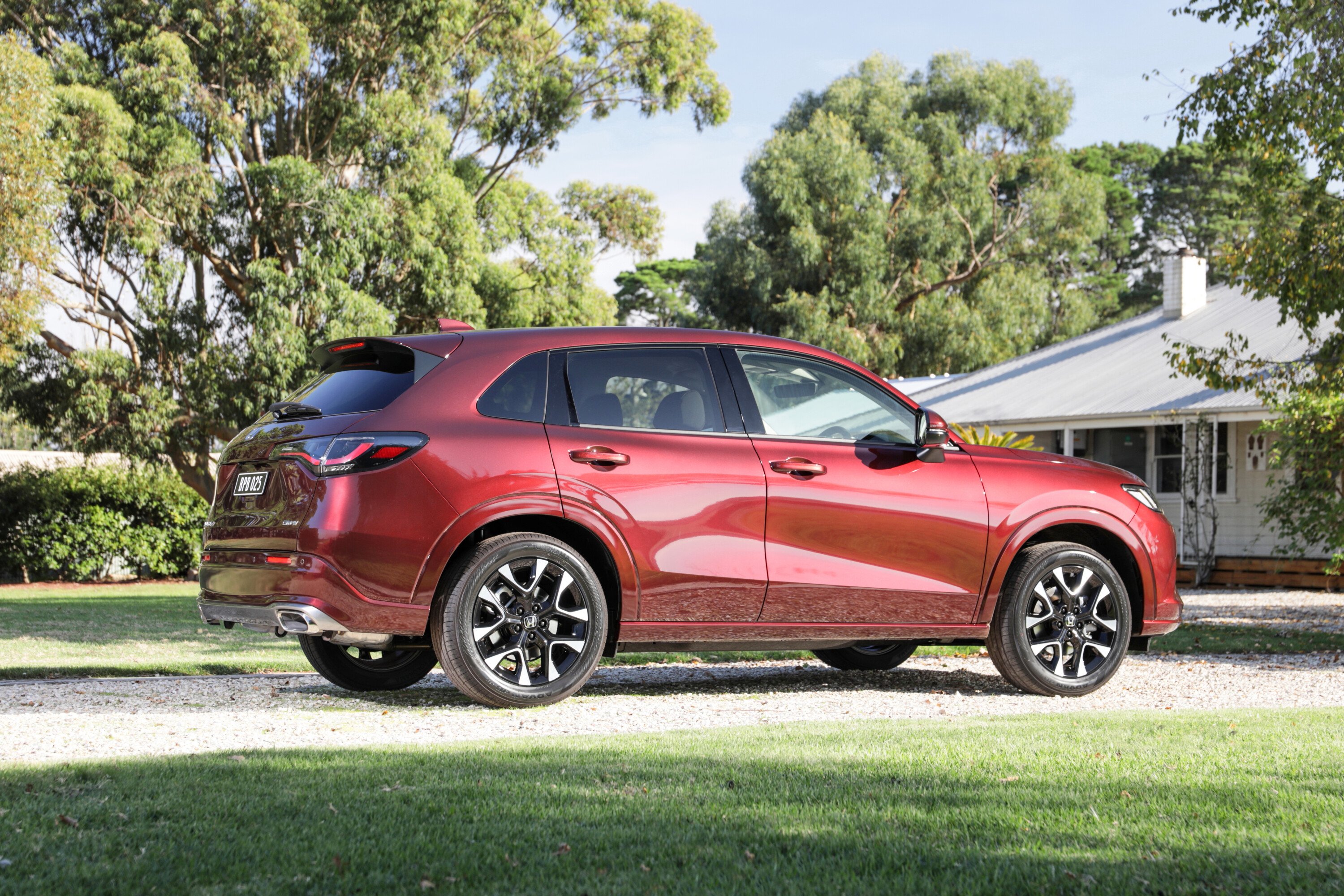
JUMP AHEAD
- How much is it, and what do you get?
- How do rivals compare on value?
- Interior comfort, space and storage
- What is it like to drive?
- How much fuel does the Honda ZR-V use?
- How safe is it?
- Warranty and running costs
- VERDICT
- Specifications
How much is it, and what do you get?
Honda has packed a heap of safety and technology features into the base VTi X, from a crisp 9.0-inch touchscreen and 10.2-inch digital driver’s display to a decent eight-speaker sound system and five years of connected services.
The cloth upholstery is far more sophisticated than the itchy fabric in a RAV4 GX – we don’t reckon you’d feel short-changed saving a couple of bucks on the $40,200 drive-away VTi X.
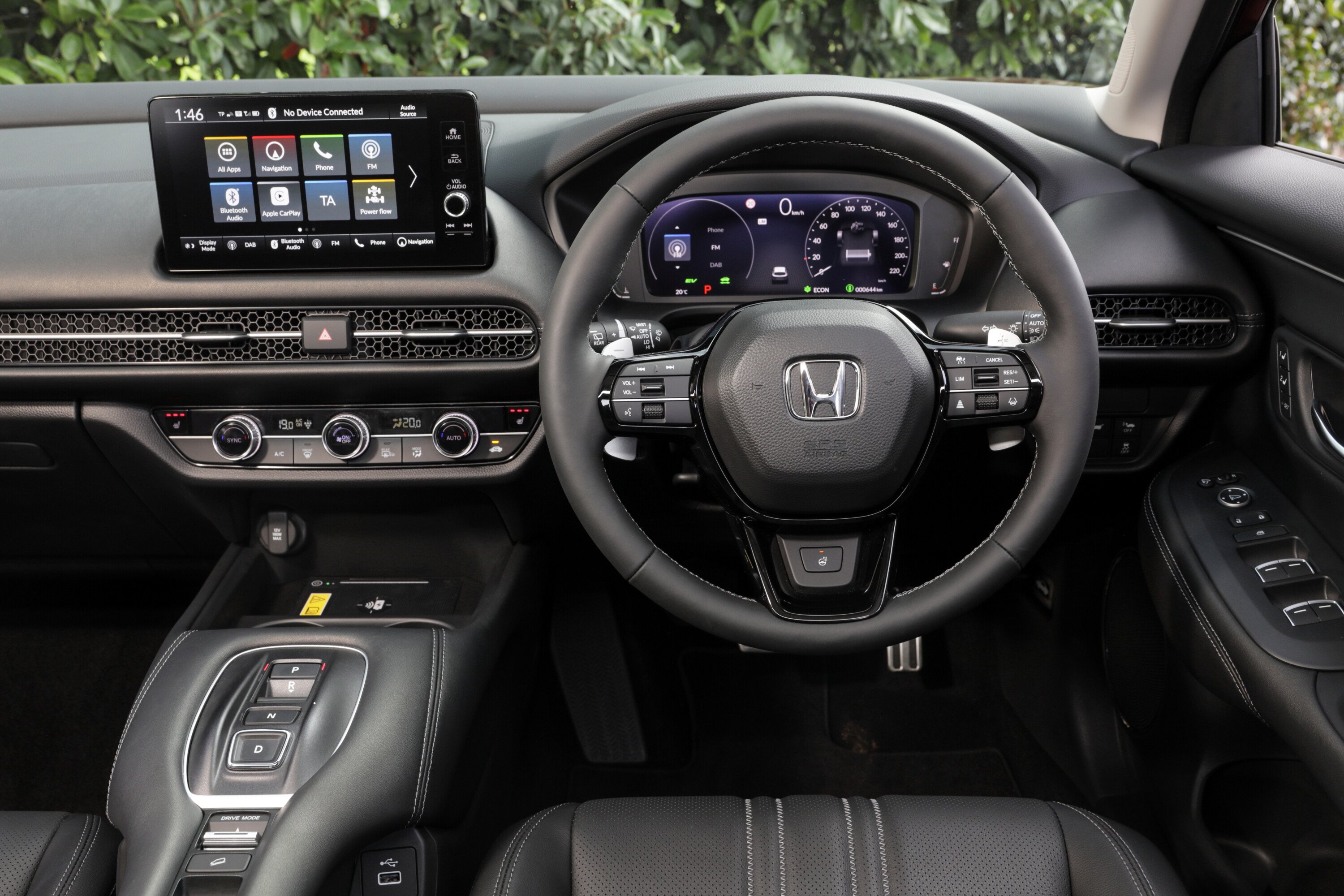
A 1.5-litre turbo-petrol four-cylinder is standard fare, kicking out 131kW/240Nm – exactly the same as the Civic. Grunt is sent via an automatic continuously variable transmission (CVT) to the front wheels, with no all-wheel-drive models coming to Australia for now.
If you want a new ZR-V immediately in Crystal Garnet, Platinum grey or Platinum white, the VTi X is the only one on dealer forecourts. Putting an order in for a hybrid (at the time of writing) will see you waiting until December.
| Honda ZR-V VTi X standard features | |
|---|---|
| 17-inch alloy wheels | LED cabin lights |
| 9.0-inch infotainment touchscreen | LED tail-lights |
| Wireless Apple CarPlay | Dual-zone climate control with rear air vents |
| Wired Android Auto | Leather-wrapped steering wheel and gear shifter |
| Eight-speaker sound system | Front and rear parking sensors |
| 10.2-inch digital instrument cluster | Rain-sensing wipers |
| Black cloth upholstery | Frameless auto-dimming rear-view mirror |
| Adaptive LED headlights | 1x USB-1, 1x USB-C, 12V socket (Front) |
| Active cornering lights | 2x USB-C (rear) |
Moving up to the $43,200 drive-away, the VTi LX brings a few extra niceties inside and out as well as the option of Crystal Blue and Crystal black paintwork, on top of the existing three colours.
| In addition to VTi X, VTi L gets | |
|---|---|
| 18-inch alloy wheels (silver) | Heated side mirrors |
| Black leather-accented seats with cloth inserts | Rear privacy glass |
| Heated front seats | Paddle shifters |
| Hands-free electric tailgate with walk-away close | |
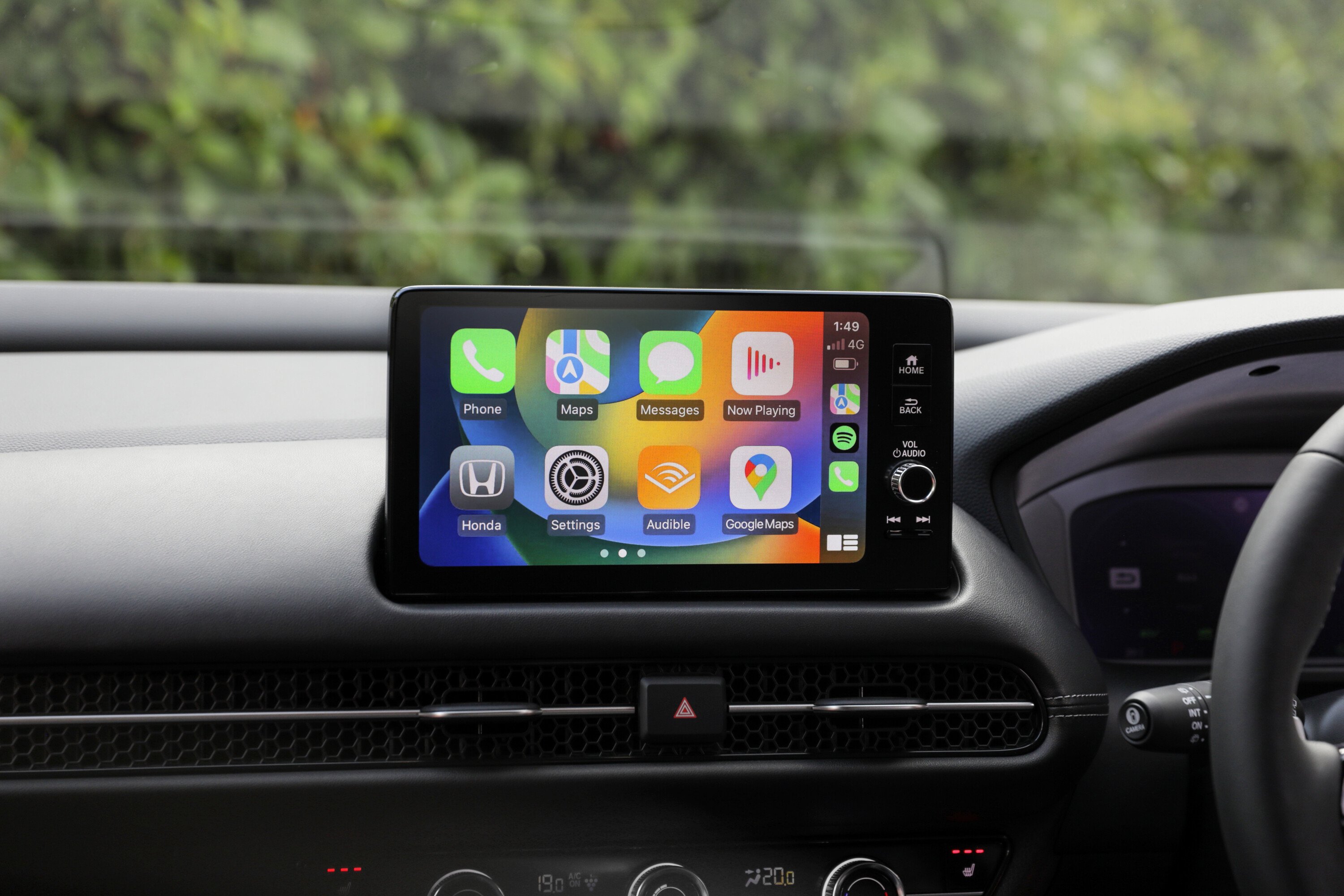
We’ve focused the bulk of our time on the flagship VTi LX grades in both petrol ($48,500) and hybrid ($54,900) guises, as Honda informs us these are in hot demand.
Identifiable by its blue badge highlights, the hybrid marries a 2.0-litre four-cylinder with an electric motor for 135kW/320Nm and costs $6400 more than the turbo-petrol.
Honda’s hybrid strategy will see more petrol-electric trim levels added down the lower end of the range in the future, though timing is yet to be determined.
| In addition to VTi L, the VTi LX gets | |
|---|---|
| 18-inch alloy wheels (two-tone) | Black leather upholstery |
| Eight-way power adjust driver’s seat with two-position memory | Four-way power-adjustable passenger seat |
| Heated front and rear seats | Heated steering wheel |
| 12-speaker Bose audio system | Colour-matched body cladding |
| Satellite navigation | Wireless phone charger |
| LED interior door illumination | Drive mode selector (normal, sport, econ) |
| 360-degree surround-view camera | Reverse auto-tilt function for side mirrors |
| LED interior door illumination | Alloy sports pedals |
| Blind-spot alert | Rear cross-traffic alert. |
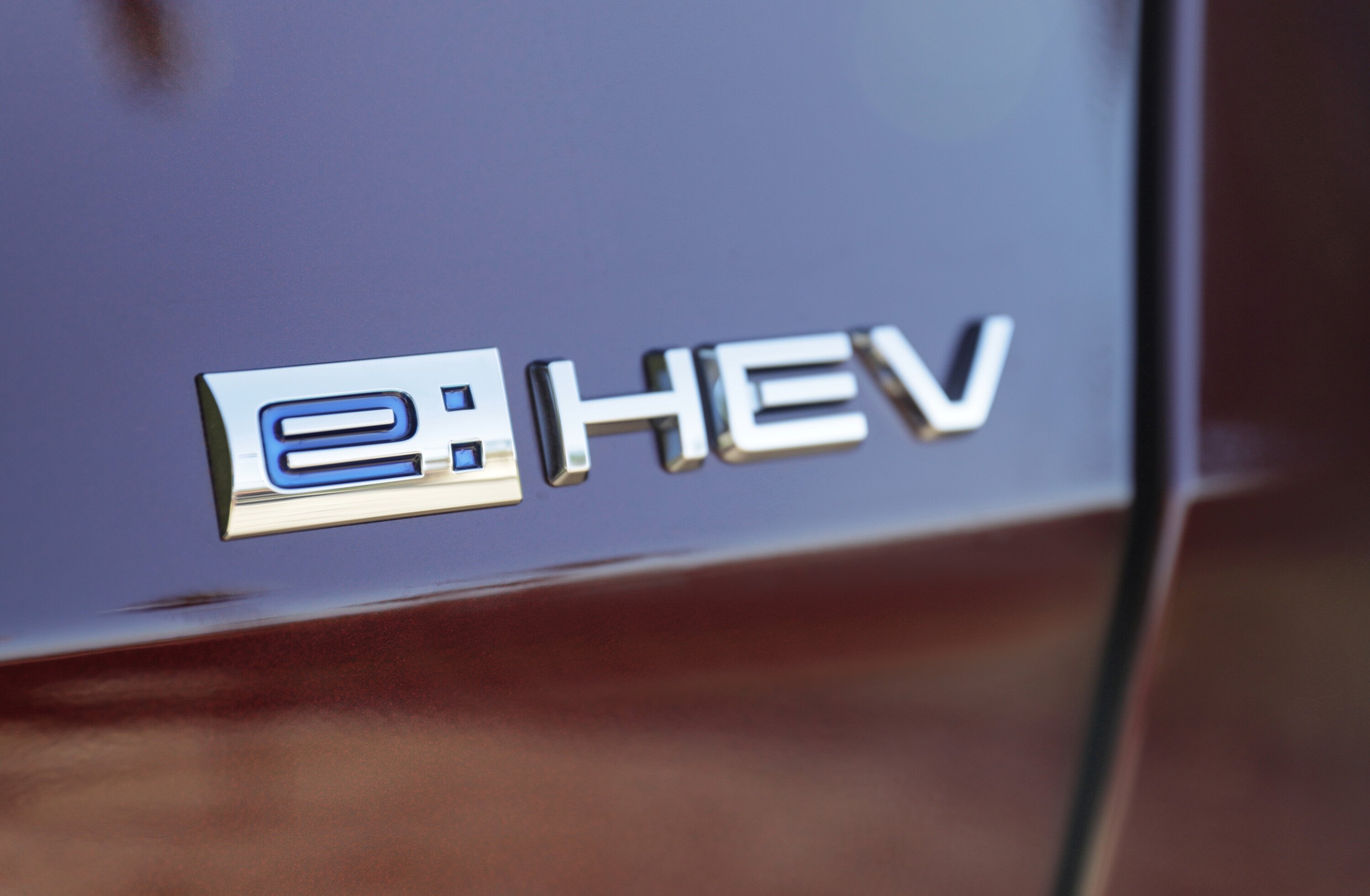
How do rivals compare on value?
Those who like to haggle are vocal about their disdain for agency models but for many (including this writer) the idea of a fixed, no-haggle price is extremely enticing… providing it’s on the money.
Honda missed the mark on Civic pricing, a fact the ZR-V e:HEV LX exemplifies – it uses the same platform and powertrains in a bigger package yet costs $100 less than the equivalent small car.
Against its direct rivals, the ZR-V compares very favourably on price, though it is a more compact vehicle – especially in boot space terms – than other medium SUVs. See the table below for a comparison between the top-spec ZR-V and its rivals.
Scroll horizontally to see the full table below.
| Honda ZR-V VTi LX Petrol | Honda ZR-V e:HEV LX | Toyota RAV4 Cruiser hybrid FWD | Mazda CX-5 G25 GT SP | Nissan X-Trail Ti e-Power | |
|---|---|---|---|---|---|
| Price (drive-away) | $48,500 | $54,900 | $56,835 | $54,827 | $59,161 |
| Drivetrain | |||||
| Engine | 4cyl, 1.5-litre, DOHC, turbo-petrol, direct-injected | 4cyl, 2.0-litre, DOHC, atkinson cycle, petrol | 4cyl, 2.5-litre w/ front electric motor | 4cyl, 2.5-litre, DOHC, direct-injected | 3cyl, 1.5-litre, DOHC, VCR, turbo-petrol, direct-injected |
| Drive | Front-wheel | front-wheel | front-wheel | all-wheel | all-wheel |
| Power | 131kW | 135kW | 160kW | 140kW | 157kW |
| Torque | 240Nm | 320Nm | N/A | 252Nm | NA |
| Gearbox | CVT | Electric motor drive, combustion motor as generator | e-CVT | 6 spd automatic | Electric motor drive, combustion motor as generator |
| Chassis | |||||
| L/W/H/Wu2013B | 4568/1840/1620/2655mm | 4600/1855/1685/2690mm | 4574/1845/1680/2700mm | 4680/2065*/1725/2705mm | |
| Track (F/R) | 1591/1605mm | 1605/1625mm | 1595mm | 1585/1590mm | |
| Weight (kerb) | 1510kg | 1586kg | 1690kg | 1693kg | 1903kg |
| Boot | 370L | 542-580L | 438L | 575L | |
| Fuel/tank | 57L | 55L | 58L | 55L | |
| Economy (combined ADR81/02) | 7.2L/100km | 5.0L/100km | 4.7L/100km | 7.4L/100km | 6.1L/100km |
| Features | |||||
| Upholstery | Leather | Leather | Leather | Leather | |
| Touchscreen size | 9.0-inch, wireless smartphone mirroring | 8.0-inch, wireless CarPlay/wired Android Auto | 10.25-inch non-touch, wireless smartphone mirroring | 12.3-inch, wireless Apple CarPlay/wired Android Auto | |
| Connected services subscription | 5 years included | 12 months included | N/A | N/A | |
| Warranty | 5 years/unlimited kilometres | 5 years/unlimited kilometres | 5 years/unlimited kilometres | 5 years/unlimited kilometres | |
| Service intervals | 12 months/10,000km | 12 months/15,000km | 12 months/15,000km | 12 months/10,000km | |
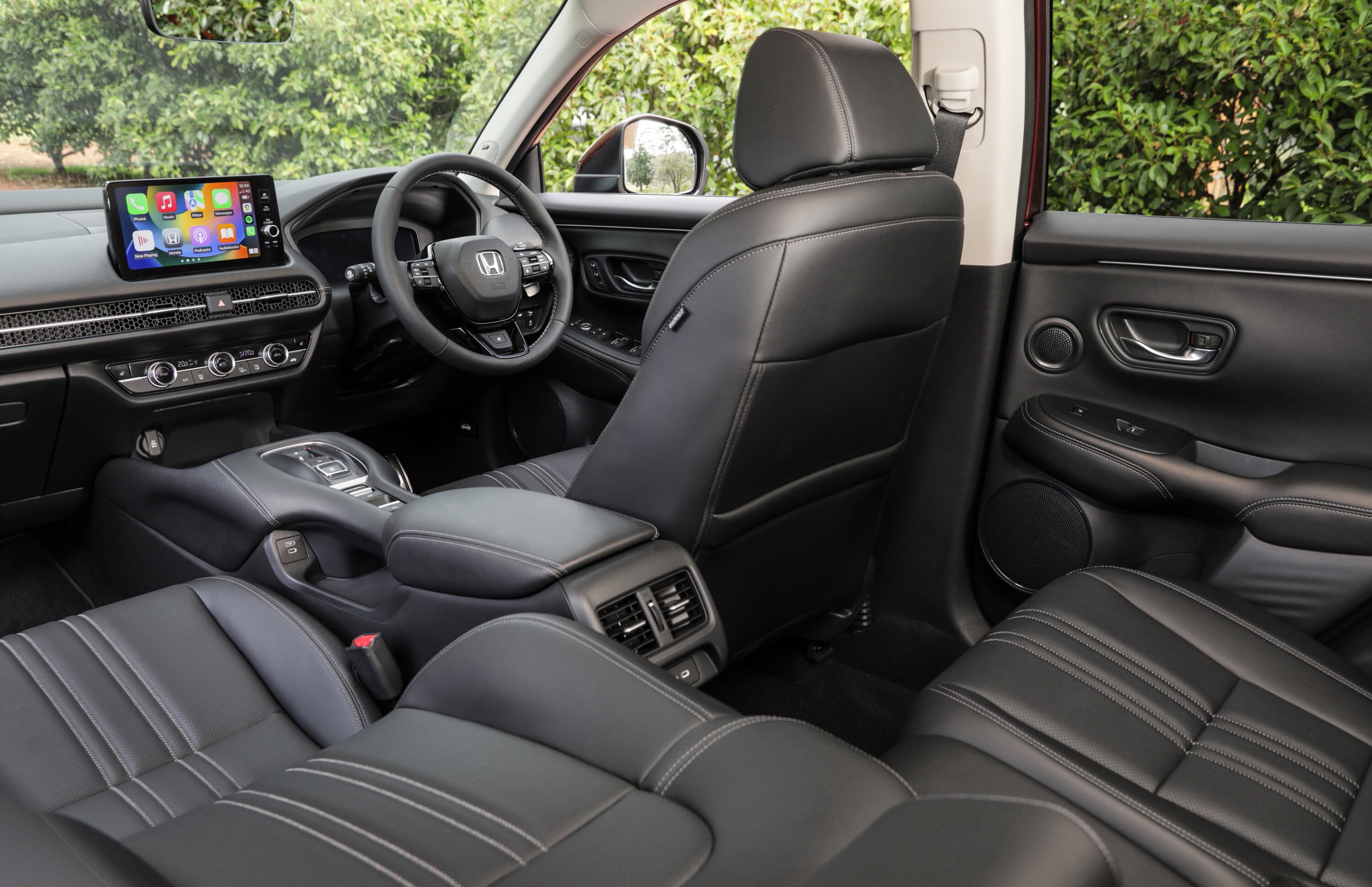
Interior comfort, space and storage
In design terms, it makes good sense that this ZR-V replaces the HR-V in the US, as its vanilla body styling (that reminds of both the Maserati Levante and Ford Escape) and rear light design are reminiscent of the second-gen small SUV.
Luckily for Honda, what matters more to a family SUV buyer is the ZR-V’s excellent cabin practicality.
With a shorter body and wheelbase than a Mazda CX-5, it’s impressive how much space Honda has found in the second row. At 188cm I had headroom to spare and good amounts of legroom. The middle seat isn’t raised and there’s no transmission tunnel, either, so three across will be relatively comfy.
Only the high-set floor proved to be an issue, crimping toe room under the front seat and leaving my knees dangling in the air. Adjustable air vents, a fold-down armrest with cup holders, two USB-C charge points, soft-touch door tops and a snug bottle holder make up the rest of the back seat.
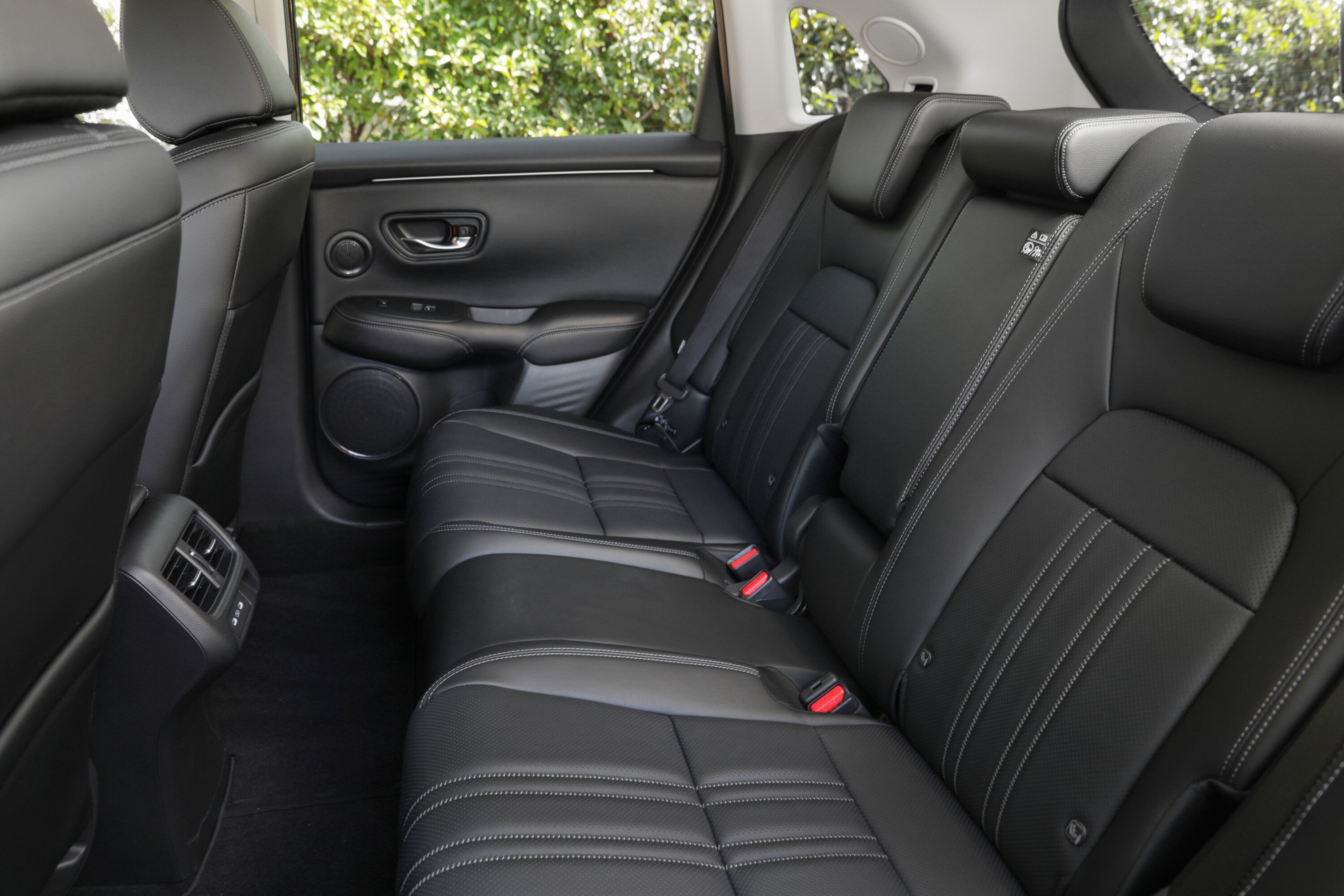
Honda’s persevered with a roof-mounted middle seatbelt and child seat tether in the ZR-V which, although perfectly functional, is ugly in practice.
ISOFIX points are provided for the outboard positions of the rear bench, and the doors open quite wide.
The boot measures 370 litres in the LX grade, which is the smallest of the conventional medium SUV set. It’s less voluminous on paper than small SUVs such as the Kia Seltos and Haval Jolion, too.
Folding the 60:40 split backrest is easy and liberates 1302L of space to the roof or 866L to the windows. In practice, that’s enough for a road bike with just the front wheel off or some flat-pack furniture. The cargo cover is sturdy and sound-insulated, while under the boot floor of petrol models is a space-saver spare tyre (the hybrid makes do with goo).
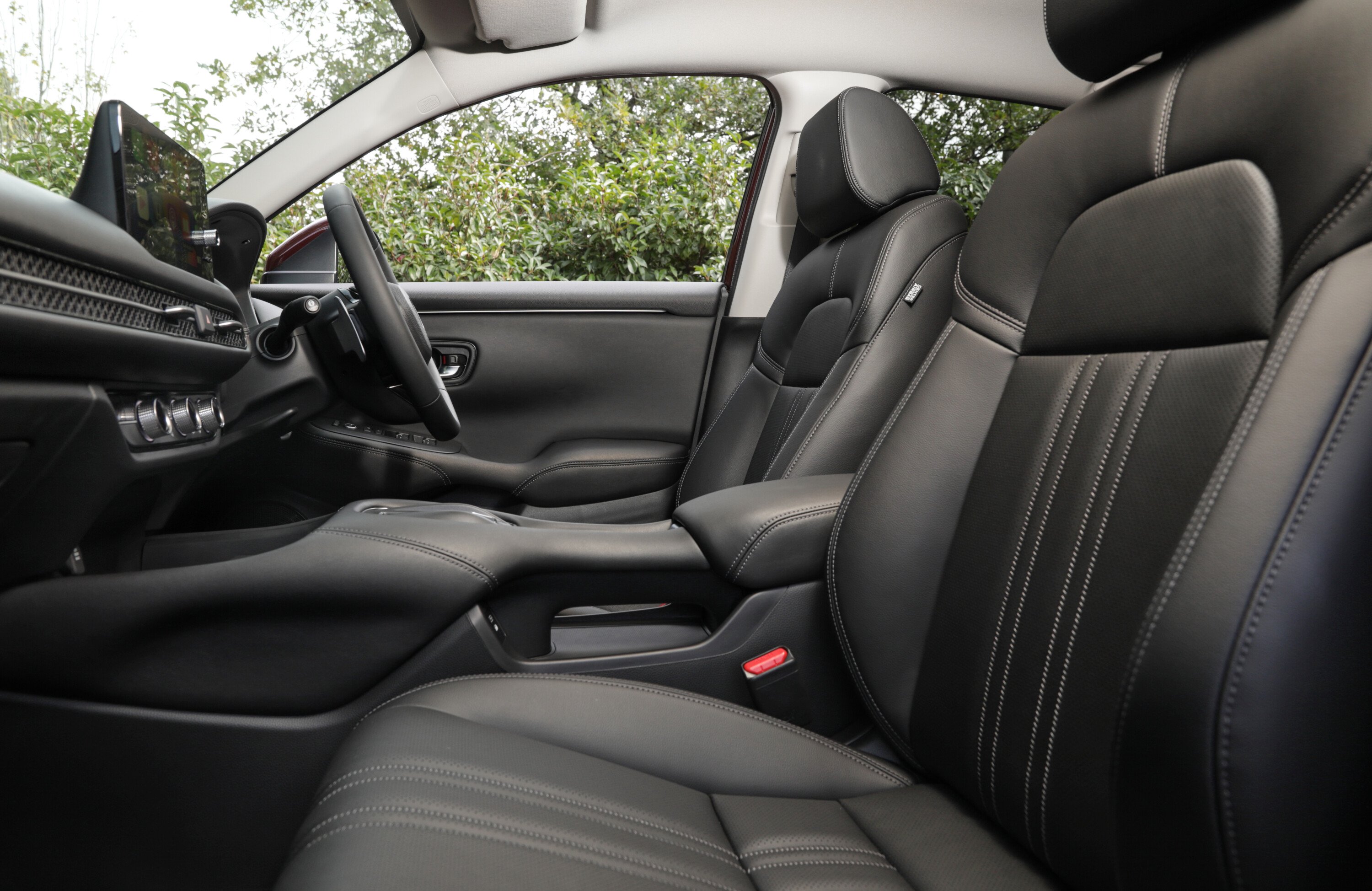
Physical climate controls and buttons for the steering wheel/seat heating are a welcome respite from increasingly touch-heavy cabins.
The power tailgate can be operated via a kick sensor on the LX, and there’s a nifty lock-as-you-walk-away (think Cool Guys Don’t Look at Explosions) function for when you have heavy boxes to carry. Following in the footsteps of the second-gen HR-V, the tailgate comes down a long way for a low load lip. The only thing not to like about the tailgate is the cluttered ‘HondaZR-V’ badge.
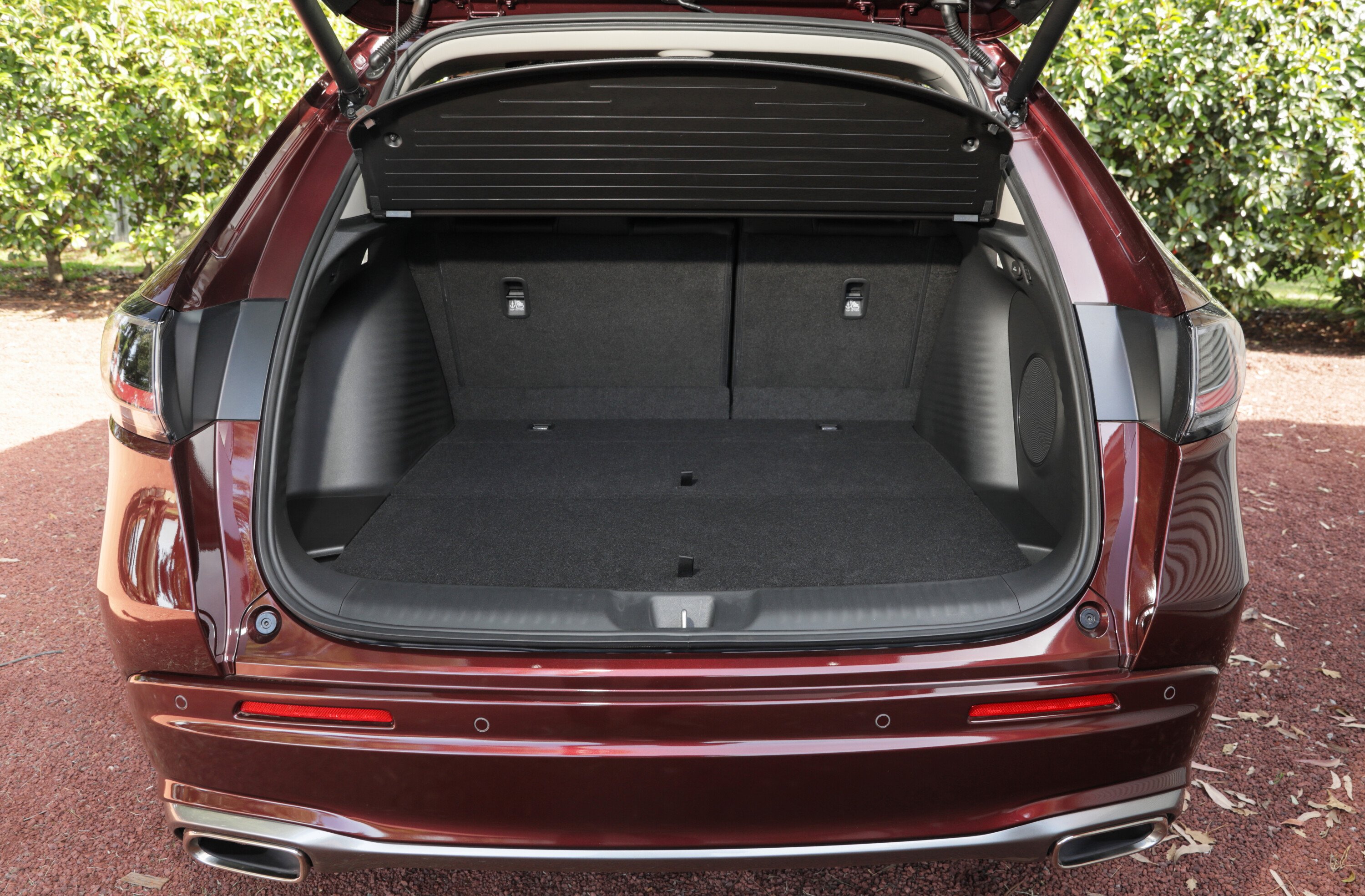
In the front of the LX grade, you get leather upholstery on your heated eight-way power-adjustable driver’s (and four-way passenger) seat. They’re pretty comfy and supportive, these pews, except for the lack of lumbar adjustment. There’s also no sunroof offered on any ZR-V – Honda executives said they skipped the moonroof due to its effect on the SUV’s design.
Physical climate controls and buttons for the steering wheel/seat heating are a welcome respite from increasingly touch-heavy cabins. The knurled knobs and volume dial are immensely satisfying to turn, and the local team confirms it’s a Honda engineer’s job to obsess over getting the ‘click frequency’ just right in the cabin.
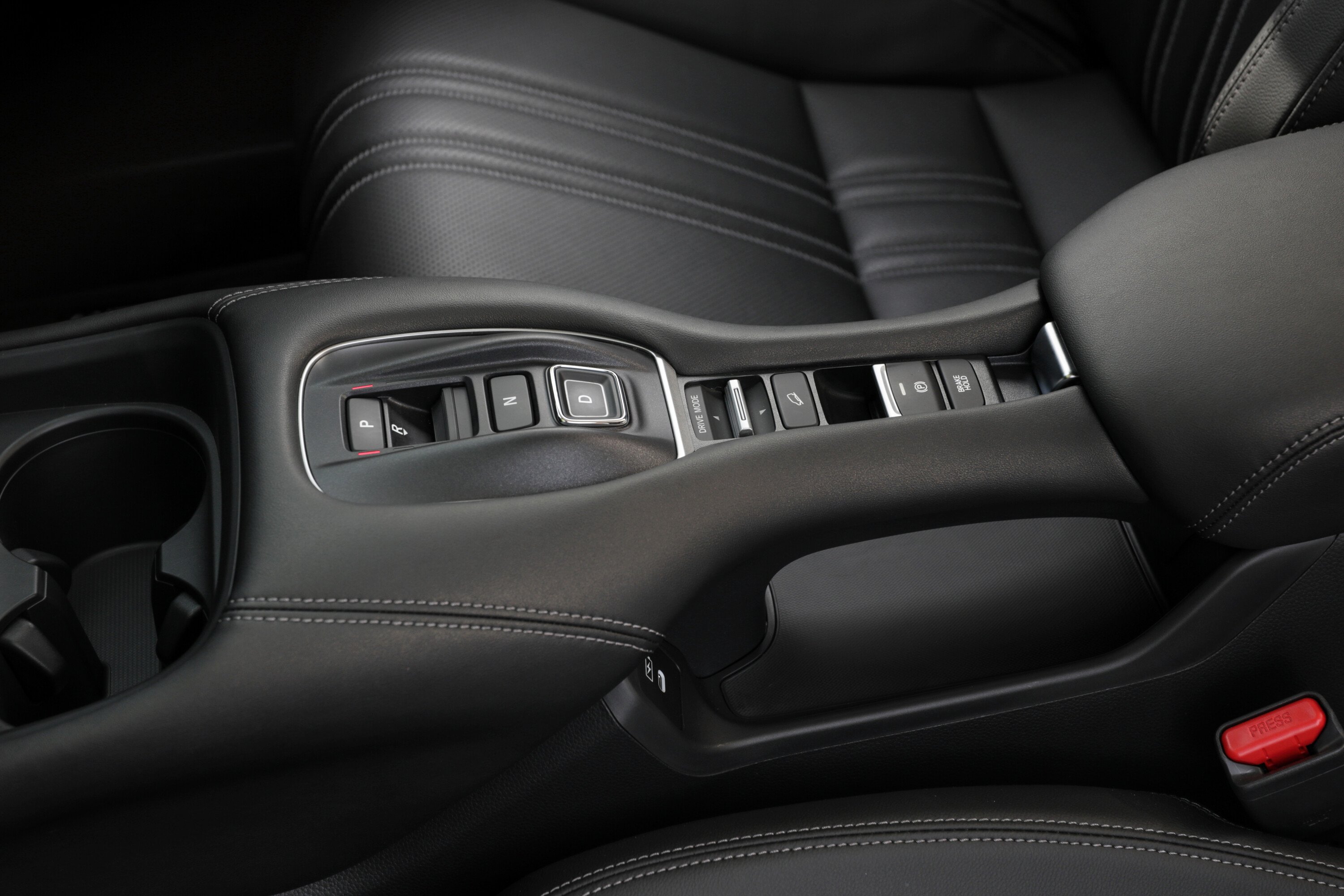
It isn’t a carbon copy of the Civic’s cabin, replacing that car’s stalk air-vent controls for paddles.
I reckon Honda allowed pets into the ZR-V design studios, too, as the central floating console and armrests look suspiciously bone-shaped, like a dog’s chew toy. Material quality is excellent, and the cabin generally feels sturdy.
The 9.0-inch touchscreen is a good size and retains some physical shortcut buttons. Wireless Apple CarPlay (and wired Android Auto) is obliged by a wireless charging pad, and there is one conventional USB and one USB-C charging socket. The door bins tightly grip 700mL water bottles, and there are deep cup holders ahead of the shifter. Beneath the armrest is a covered cubby perfect for valuables.
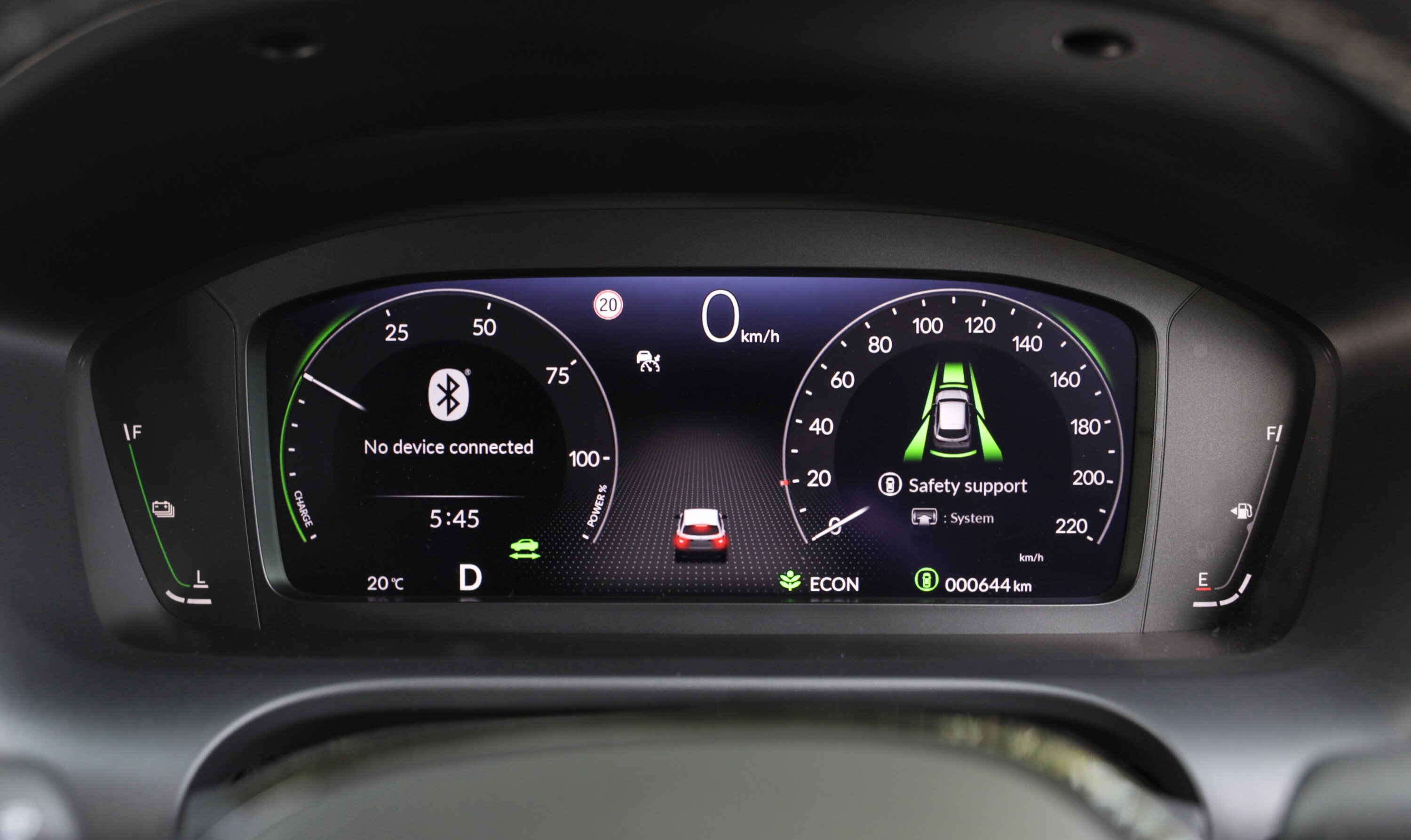
What is it like to drive?
Strapping into the petrol ZR-V first, it’s no surprise that this medium SUV feels familiar as underneath is the Civic’s basic chassis and 1.5-litre turbo-petrol four-cylinder.
It fires into life with minimal noise thanks to excellent refinement. Even when accelerating onto the freeway, the 240Nm torque peak beginning at 1700rpm means there’s no need for the engine to churn ear-piercing revs and the responsive CVT has been tuned to harness this mid-range motivation.
The ZR-V is brisk enough yet rarely troubles the front tyres’ traction. This is a good thing, as the ZR-V is only available in FWD in Oz. Forward and side visibility is good, though the small rear windscreen makes looking out the back a little difficult.
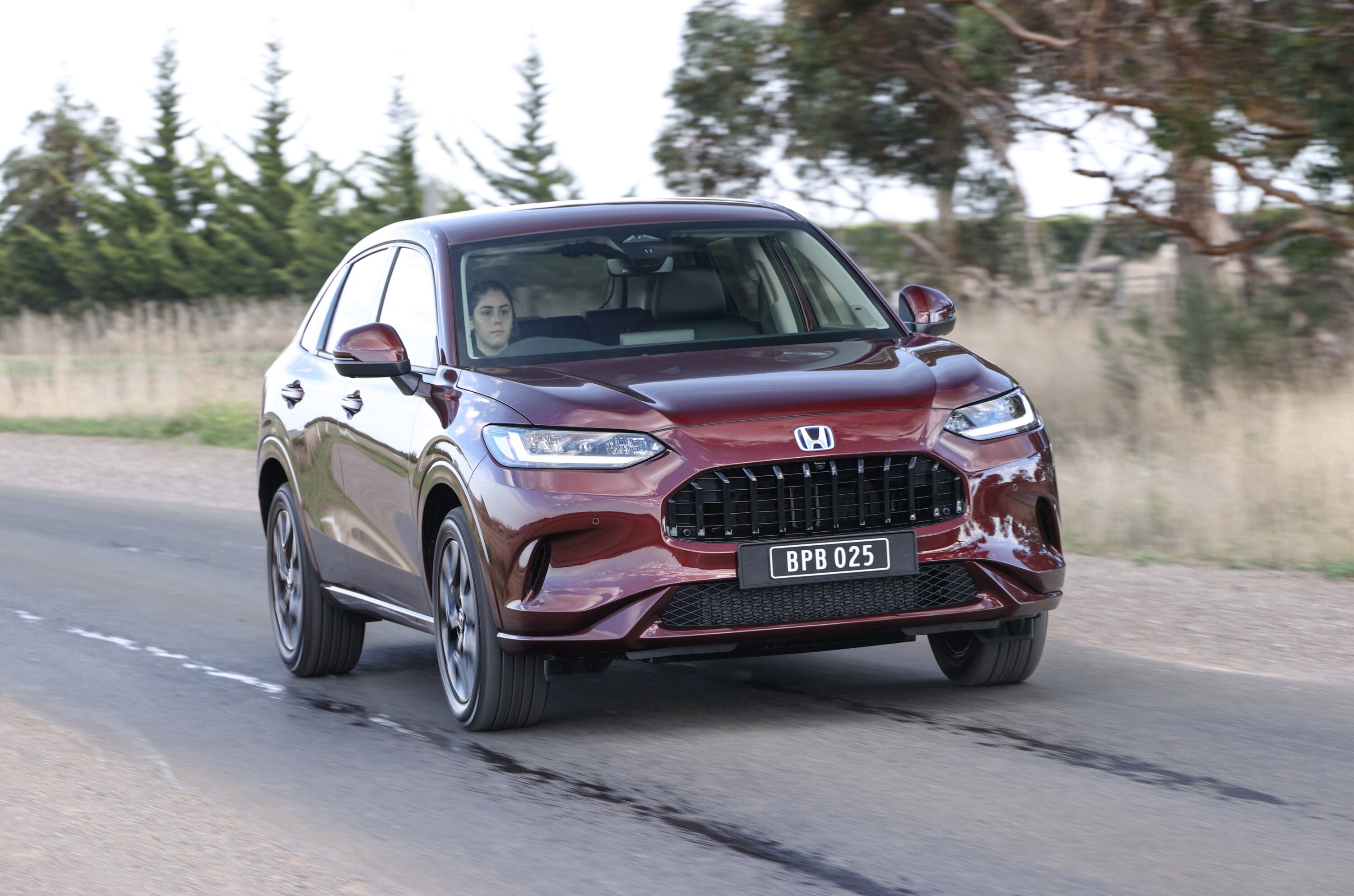
Making our way through Sydney’s South Western suburbs and over their broken tarmac, the ZR-V’s ride quality is impressive.
The Honda’s body stays flat and there’s plenty of wheel travel to soak up sharp bumps, although it isn’t quite as plush as a Nissan X-Trail.
As a result, the agile ZR-V resists body roll through the following twists and turns of Sydney’s Royal National Park. Being lighter than most rivals (1510kg for the petrol) helps, as does the responsive and weighty steering feel in Sport mode.
Once you’re in the meat of the left pedal (beyond some initial squish) it’s easy to smoothly modulate the ZR-V’s brakes, too. If there’s one complaint, it’s tyre roar from the 225/55R18 Advan dB552s which penetrates the ZR-V’s cabin on coarse-chip bitumen.
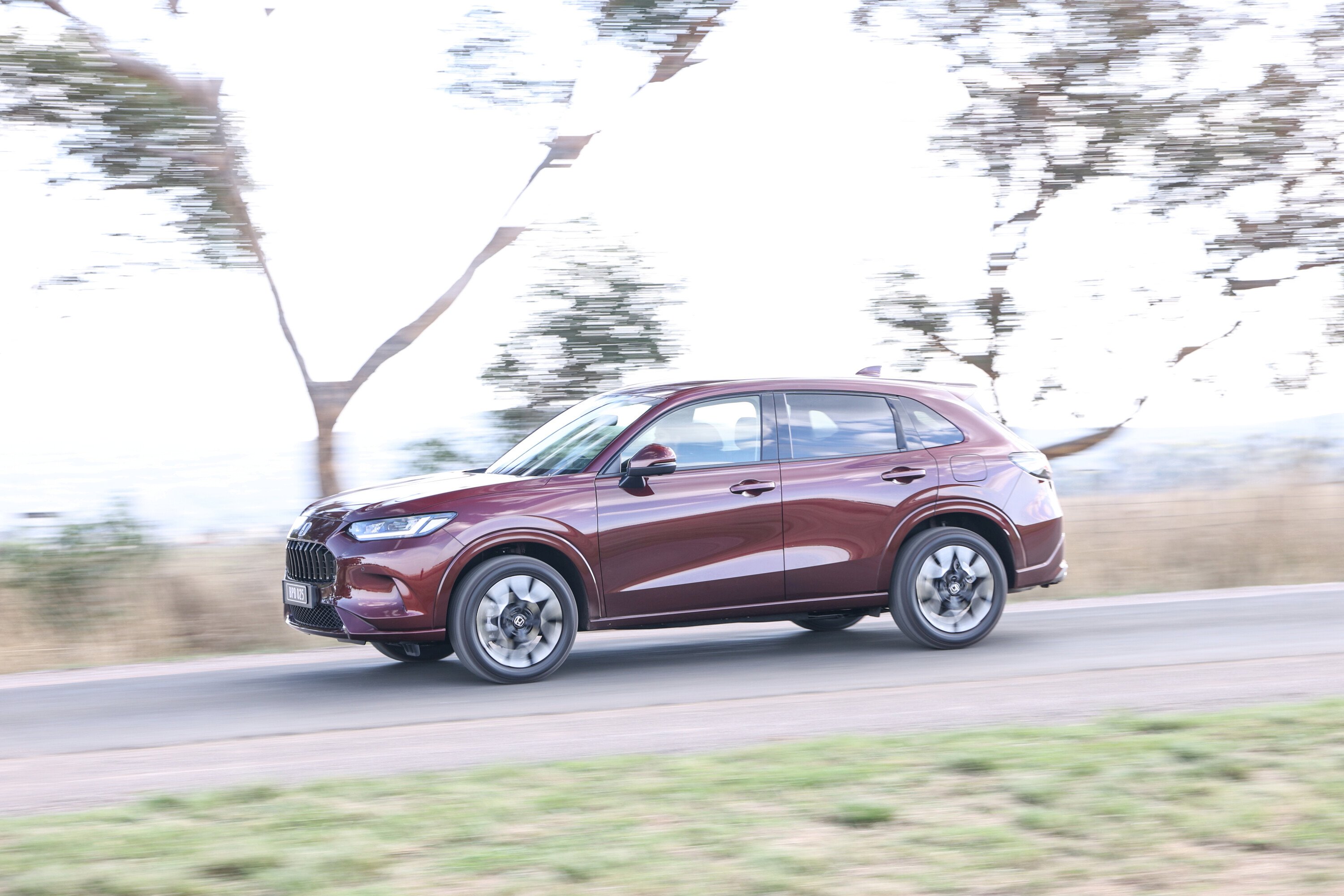
And the hybrid?
A quick pee break and swap into the hybrid introduces a couple of doubts. Starting with the push-button gear selector which, unlike the shift-by-wire in a Nissan X-Trail, fails to liberate any useful interior space. It does look pretty cool, at least.
Heading straight back into a set of downhill bends, the hybrid feels heavy on the road, yet its steering tune is lighter with a confidence-eroding dead-zone just off-centre. The brake feel is at least natural, and the extra 76kg of battery and electric gubbins seem to settle the low-speed ride even more.
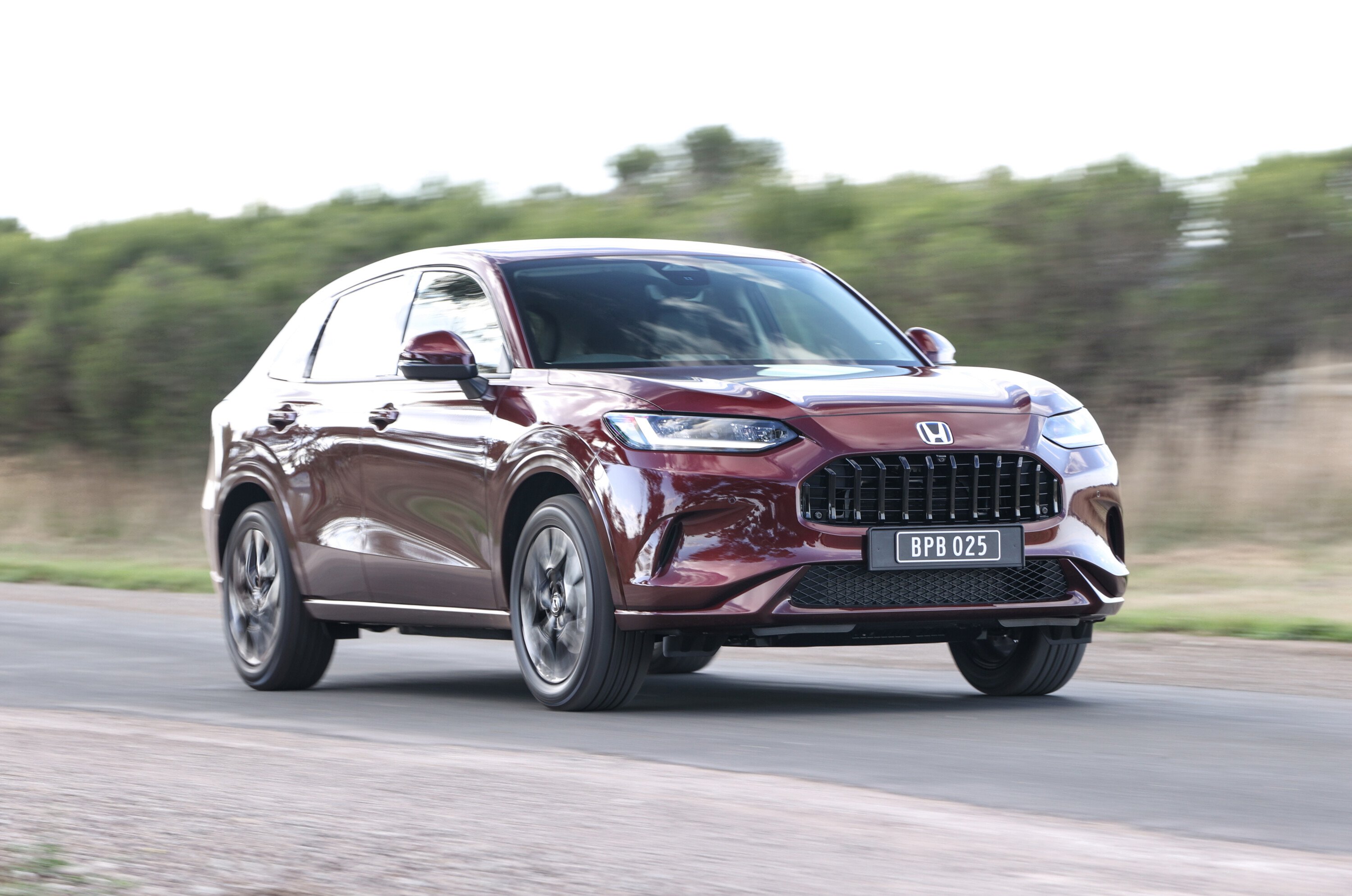
Honda’s series-parallel e:HEV hybrid system is able to turn the front wheels using battery power, the 2.0-litre piston engine, or a mix of the two.
The throttle is responsive and the ZR-V’s well-calibrated hybrid used electric-only mode for extended periods, managing to crack 50km/h on battery power alone. There’s even adjustable regenerative braking using the steering wheel-mounted paddles – though don’t expect a full-on one-pedal driving experience.
It’s quieter in the hybrid than the petrol, too, with its low rolling resistance Bridgestone Alenzas introducing minimal tyre roar.
If any of the terms in this section have left you scratching your head, these articles will help bring you up to speed!
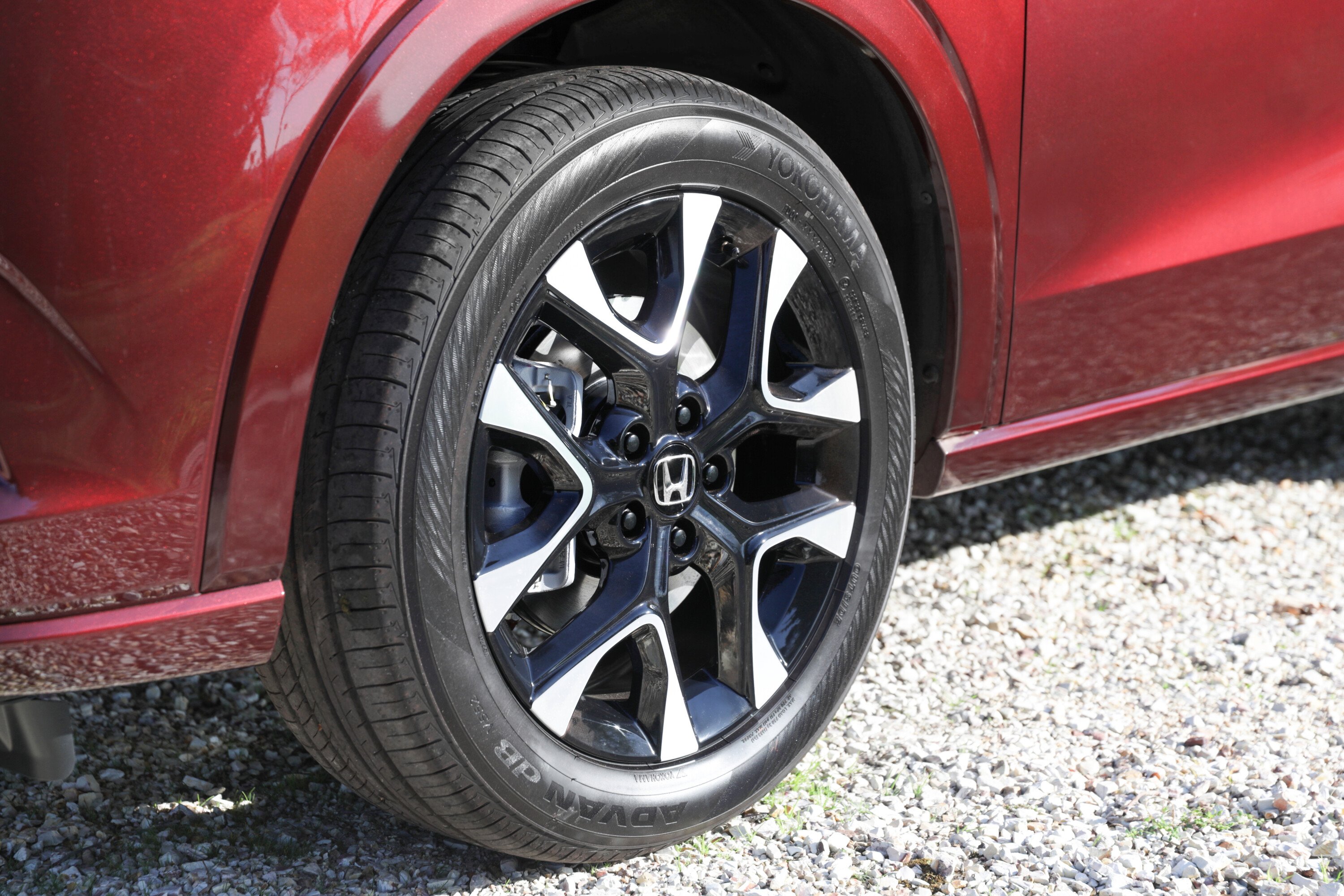
- What is a Powertrain or Drivetrain?
- Power vs torque
- Car suspension explained
- Automatic transmissions (‘gearboxes’) explained
- Chassis control systems explained
- Car vs Ute vs SUV: How the vehicle you buy should guide the way you drive
What you really care about, if you’re investing the extra $6400 into a hybrid (we’re yet to be convinced it’s worth the extra cash on drive alone), is fuel economy.
Our result? We almost nailed the 5.0L/100km ADR combined rating, bringing the 5.8L/100km trip computer reading down to 5.1L/100km as we came to rest.
The route may have been mostly downhill, but this kind of proximity to an ADR figure on a media launch bodes well for the future. Expect 5-5.5L/100km in daily use.
As good as the hybrid is, the petrol didn’t disappoint either, reading 7.3L/100km after the first leg, and exactly the same by the time we arrived back at base. Both engines will accept 91 RON unleaded petrol.
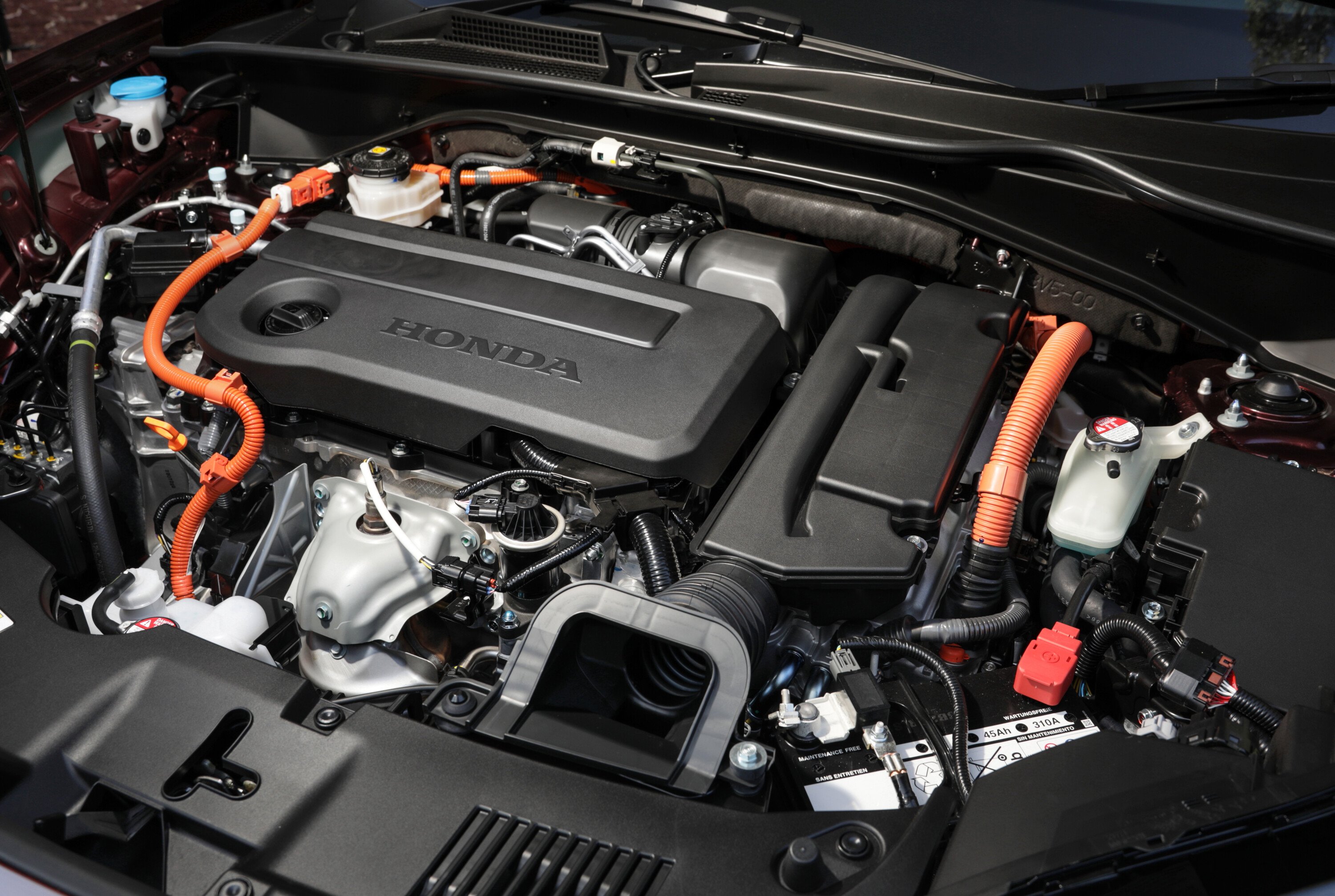
How safe is the Honda ZR-V?
The Honda ZR-V is yet to be evaluated by Euro NCAP or ANCAP, though it was given the North American IIHS’s highest accolade – the mouthful that is ‘Top Safety Pick Plus’.
It features plenty of adaptive safety systems and driver aids range-wide, along with pedestrian, cyclist and junction-detecting autonomous emergency braking.
The only thing missing from the base X and mid-spec L is blind-spot monitoring and rear cross-traffic alert; that’s only available in the LX flagship.
| 2023 Honda ZR-V active safety features | |
|---|---|
| Autonomous emergency braking (vehicle, pedestrian, cyclist) | Adaptive cruise control with stopp & go (traffic jam assist) |
| Lane-keep assist | Traffic sign recognition |
| Lane departure warning | Driver attention monitor |
| Road departure mitigation | Rear seat reminder |
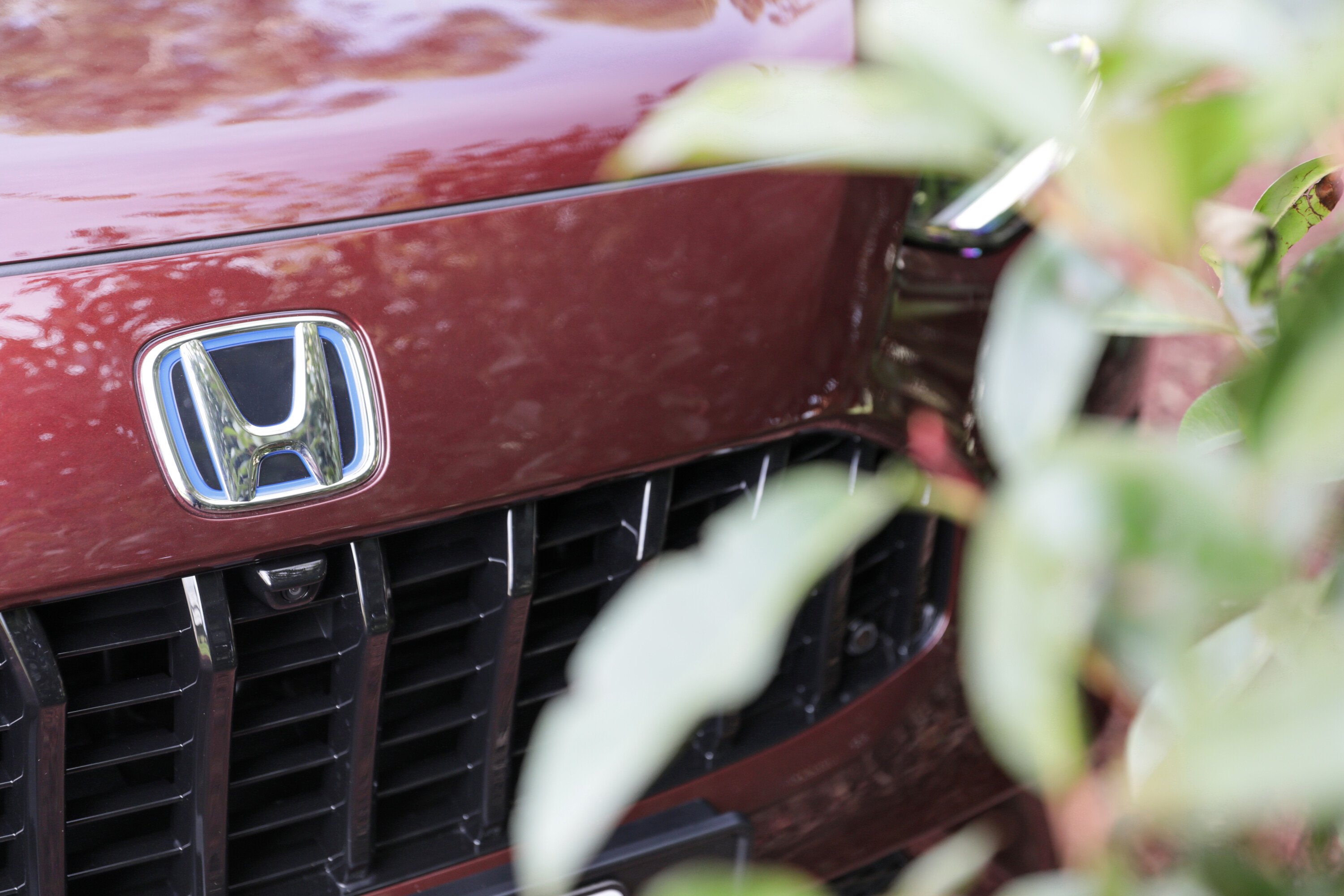
Warranty and running costs
The ZR-V is covered by a five-year/unlimited-kilometre warranty in Australia.
Maintenance is due every 12 months or 10,000km, which is slightly shorter than most rivals that allow 15,000km between services.
Honda hits back with five low-price services, meaning the ZR-V will only cost $995 over five years, equating to $199 per visit to the Honda dealership.
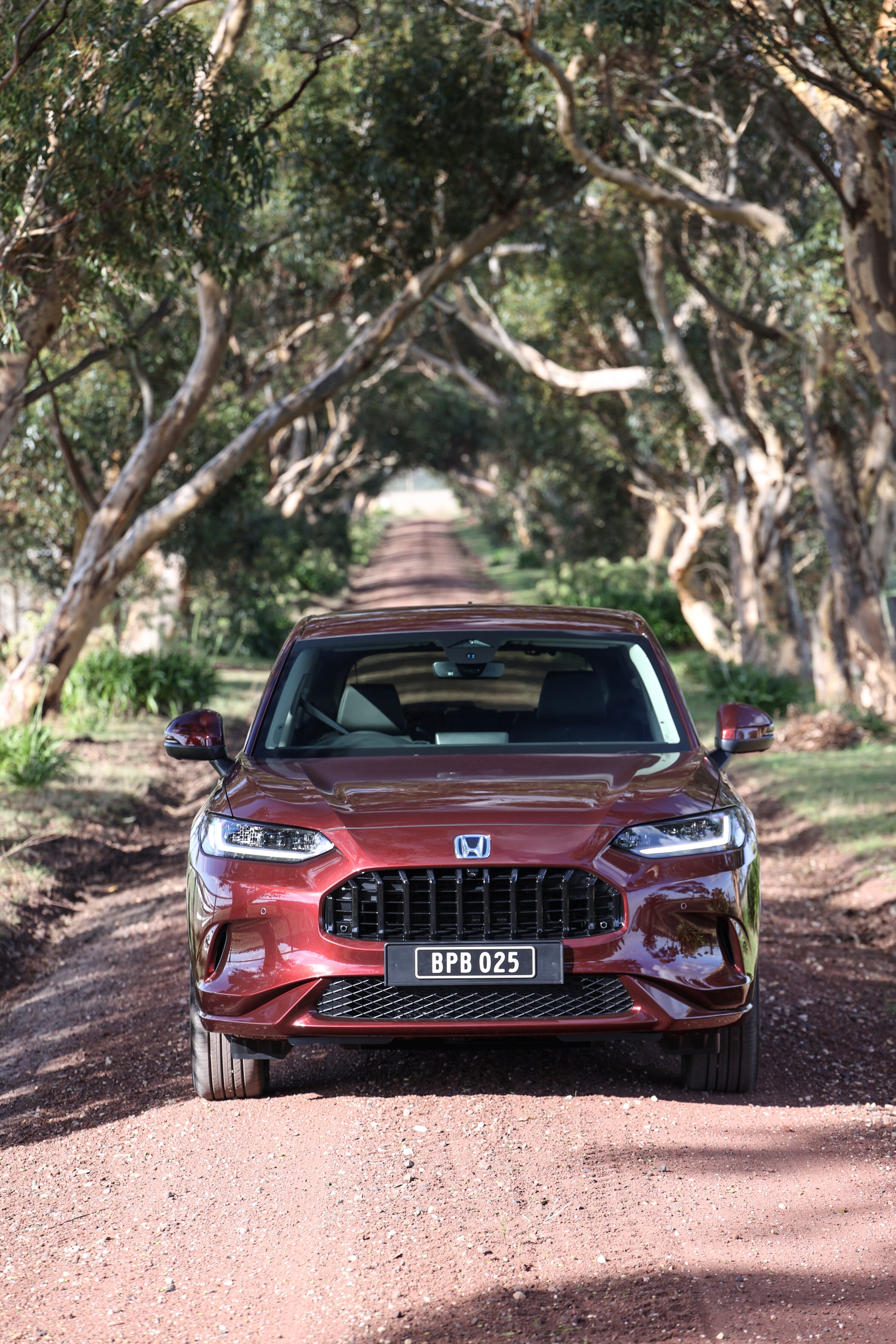
VERDICT
A well-priced medium SUV with up-to-date safety and technology, enough space for the whole family and a fuel-sipping hybrid powertrain?
Honda is onto a winner with the ZR-V.
Backed up by the Civic hatch’s excellent DNA that imbues it with talent on a back road without sacrificing smooth ride quality and, apart from its small boot, the ZR-V is an enticing package.
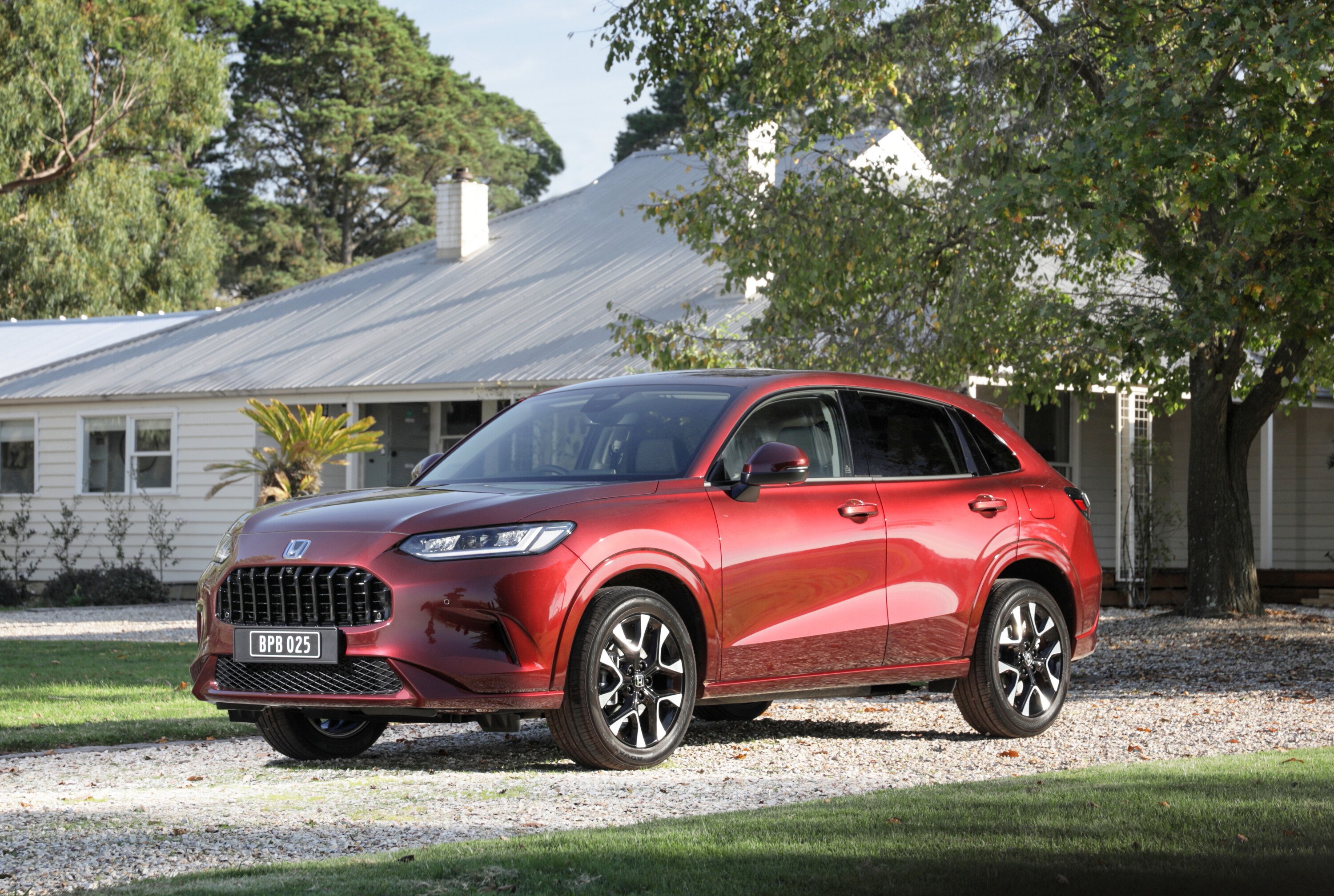
Now comes the tricky bit: To create interest and recognition around the ZR-V nameplate, and secure more stock with a broader choice of hybrid variants.
If the Civic Type R proves Honda hasn’t forgotten how to make stunning vehicles, it’s now the ZR-V’s turn to demonstrate whether Honda Australia has the sales mojo to challenge Toyota.
2023 Honda ZR-V specifications
| Honda ZR-V VTi LX Petrol | Honda ZR-V e:HEV LX | |
|---|---|---|
| Price (drive-away) | $48,500 | $54,900 |
| Drivetrain | ||
| Engine | 4cyl, 1.5-litre, DOHC, turbo-petrol, direct-injected | 4cyl, 2.0-litre, DOHC, atkinson cycle, petrol |
| Drive | Front-wheel | front-wheel |
| Power | 131kW | 135kW |
| Torque | 240Nm | 320Nm |
| Gearbox | CVT | Electric motor drive, combustion motor as generator |
| Chassis | ||
| L/W/H/Wu2013B | 4568/1840/1620/2655mm | |
| Track (F/R) | 1591/1605mm | |
| Weight (tare) | 1439kg | 1555kg |
| Boot | 370L | |
| Fuel/tank | 57L | |
| Economy (combined ADR81/02) | 7.2L/100km | 5.0L/100km |
| Suspension | Front: struts, stabiliser bar. Rear: multi-link stabiliser bar | |
| Steering | Rack-assisted progressive electric power steering, 2.4 turns lock-lock | |
| Front brakes | Ventilated rotors | |
| Rear brakes | Solid rotors | |
| Tyres | Yokohama Advan dB V552 | Bridgestone Alenza |
| Tyre size | 225/55R18 | 225/55R18 |
| Safety | ||
| ANCAP rating | NA | |
| 0-100km/h | 9 seconds (est) | 8.5 seconds (est) |
Score breakdown
Things we like
- Well-presented cabin with up-to-date tech across the range
- Planted chassis and comfortable ride
- Seamless hybrid operation
- Agency model easier to swallow when the price is right
Not so much
- Rather small boot
- High-set floor in second row
- Blind-spot monitoring reserved for top grade
- Hybrid’s inconsistent steering feel
We recommend
-
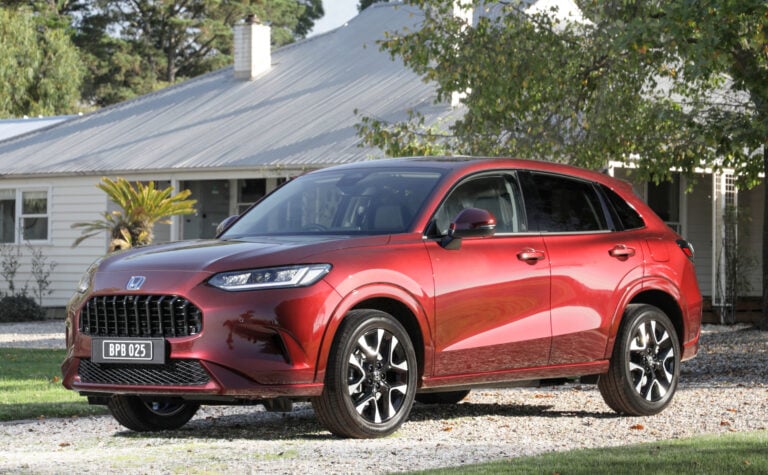 News
News2023 Honda ZR-V pricing and features
Honda has confirmed local details for its new Mazda CX-5-rivalling ZR-V medium SUV, with available petrol or hybrid power
-
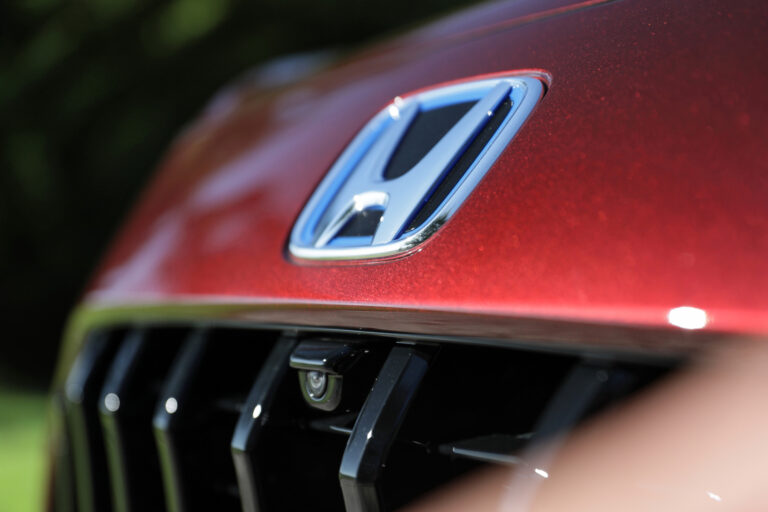 News
News2024 Honda ZR-V to drive sales boost as EVs remain off-limits
New SUVs to drive Honda deliveries to 20K annually, but EVs won’t help out
-
 News
NewsNew car calendar 2026: All the new cars coming to Australia next year
Here’s the WhichCar by Wheels guide to all the new cars that will launch in Australia in 2026. Check back in regularly for updates...



